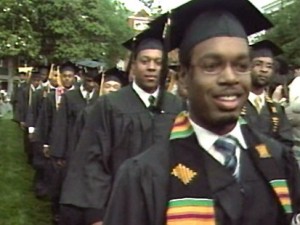(ThyBlackMan.com) During a four-year college career, most students take roughly 40 courses. Personally, I went to graduate school for another seven years after college, taking an additional 40 to 50 more classes. During my entire undergraduate, masters and doctoral experience, I never had one African American professor.
This experience made the educational process incredibly uncomfortable for me. I never experienced the privilege of my white classmates, who had teachers they could relate to, work with and connect to on a meaningful level. I did meet one African American professor (I never took his class) named Dr. Tommy Whittler. He is the sole reason I became a professor. He was the first faculty member who’d ever taken time to mentor me.
Unfortunately, Dr. Whittler was the only African American professor to ever be tenured in the history of the entire business school at the University of  Kentucky (the business school has several departments and none of them, except one, had given tenure to a black man in more than 100 years). Tenure is basically when the university gives a permanent job to a faculty member to replace the temporary position. If you don’t get tenure, you’re typically fired. The same promotion that had been granted to hundreds of white men before Dr. Whittler had only been granted to one African American, with all the rest either being fired or not hired in the first place. Another professor who mentored me during my doctoral studies at The Ohio State University, WC Benton, was at the time, the only African American to be tenured in the history of that business school as well.
Kentucky (the business school has several departments and none of them, except one, had given tenure to a black man in more than 100 years). Tenure is basically when the university gives a permanent job to a faculty member to replace the temporary position. If you don’t get tenure, you’re typically fired. The same promotion that had been granted to hundreds of white men before Dr. Whittler had only been granted to one African American, with all the rest either being fired or not hired in the first place. Another professor who mentored me during my doctoral studies at The Ohio State University, WC Benton, was at the time, the only African American to be tenured in the history of that business school as well.
Unfortunately, my experience as a college and graduate student is not uncommon. According to an recent survey taken at YourBlackWorld.com, nearly half of all African Americans who attended a predominantly white university (42 percent) never had a single black professor during four years of college. Nearly three-quarters of these students (74 percent) only had one black professor in a field outside of African American studies.
There are various theories regarding why black professors are missing in many of America’s universities. Many African-American and Latino students are turning to online degrees after seeing that they aren’t represented in universities and colleges. To hear the story told by many campus administrators, black professors are missing because they simply don’t exist or are all unqualified to teach at predominantly white institutions. “We can’t find qualified minorities” is the typical comment made on many campuses who claim to seek diversity.
In my experience teaching at the college level over the past 17 years, I cannot agree with this assessment. My in-box is full of stories from black professors all over the country who either cannot get academic jobs, or who were released from their campuses because they “didn’t fit” with the culture of the faculty in their departments. This form of racial discrimination is most prevalent in schools of business and engineering. There is a way of thinking and doing things that fits into white American culture that ultimately leads many white scholars to consider black professors to be inferior, in large part because we are different. In other words, it’s White Supremacy 101, or what Dr. Christopher Metzler refers to as “academic imperialism,” where predominantly white institutions either punish black scholars for doing work that engages with the black community, or places them in the Black Studies Departments to marginalize them from the mainstream of academic administration.
When black faculty are hired on many campuses, most of them are not given tenure and are instead given temporary visiting positions to improve the school’s diversity numbers. Harvard Law School, for example, just granted tenure to only the second black woman in the school’s nearly-200-year history. (I argued that this move was in response to national controversy about Harvard’s racially discriminatory hiring practices in light of the Elena Kagan nomination to the Supreme Court). Associate Justice Kagan, the former dean of Harvard Law School, helped conduct 32 hires of tenured or tenure-track faculty, and did not hire one single African American, Native American or Latino faculty member. This is in spite of the fact that there are thousands of highly trained black and brown attorneys who’d love to teach at Harvard. Many campuses, such as the business schools I’ve attended, have tenured no more than one African American in any department in the last 100 years, and most of them don’t even hire black professors to begin with. What’s most interesting is that the campuses are very quick to blame the victim, stating that black faculty would receive more opportunities if they would simply step up their game and make themselves more qualified. But given the struggles of leading black scholars such as Cornel West and Michael Eric Dyson, the truth is that the devaluation of black scholarship and black scholars themselves is the most likely culprit in this tricky racial mirage.
The Campus Accountability Project is an initiative designed to begin holding campuses accountable for their diversity numbers. Many universities refuse to share data on the numbers of African Americans who’ve been hired or tenured, primarily because the results are so embarrassing. Additionally, there is an interest among black college students and alumni around the nation to see the problem mitigated. Equally intriguing is the fact that many Historically Black Colleges and Universities (HBCUs) don’t hire very many African American faculty either. Within the pool of survey participants who attended HBCUs, half (50.5 percent) didn’t have more than three African American professors in a field outside of African American or Africana Studies during their four years of attending an HBCU. Professors from other countries are sometimes accused of using their powerful positions to lock out people who are not of the same ethnic background, so qualified African Americans have trouble getting access to black students at HBCUs, especially in the sciences. In fact, many HBCUs have no more than one or two African American male faculty in their business schools or the sciences. I recommend you take a look at your own campus to see if the theory holds true.
The presence of black faculty can make all the difference in the world when it comes to helping black students clearly visualize their personal goals. Black students and their parents should speak on the issue and ask universities the hard questions regarding exactly who will be educating their children. The lack of diversity on college campuses is a serious and persistent problem, and it serves to impede the likelihood of success for our children.
Staff Writer; Dr. Boyce Watkins
Dr. Boyce Watkins is the founder of the Your Black World Coalition. For more information, please visit http://BoyceWatkins.com.

















Brotha Watkins,
I realize you penned this article a few years ago, but I am just coming across it as I am doing some research on the status of HBCUs.
First off, I’d like to thank you for bringing light to a topic that many of us do not give much thought to in our daily lives. I’d like to start by saying that I am a black man that got both his undergraduate and graduate degrees at predominately white institutions (PWIs). So I know first-hand that what you say is not incorrect. I studied at a very large PWI for undergraduate, and I remember only having two black instructors (one was a professor in the African-American history department and the other was an instructor in the mathematics department). But given the reality of what you said, what really can be drawn from this? The cold hard fact of that matter is that WHITE PEOPLE DO NOT WANT BLACK PROFESSORS ON THEIR CAMPUSES. Unlike black people, white people take full responsibility for educating their children. They do not, I repeat DO NOT want blacks educating their children. The few blacks you do see tenured on these campuses are ornamental and HIGHLY monitored. Sure, they’ll hire just enough of you to keep you all focused on joining their institutions and neglecting your own (HBCUs). If you were to conduct deeper analysis, you’d see that most of these black professors at PWIs are isolated and often have inferior status within their own departments. They simply do not enjoy the same value as their white counterparts. Black professors are more likely to have greater administrative duties than their white counterparts, often have heavier teaching loads, and are often more likely to serve as faculty representative for multiple student organizations. In other words, black faculty are doing the “crap” work that white professors do not want to do. Where is the value in that?
This brings me to my second point. Dr. Watkins, I do respect your scholarship and the work that you do, but I often wonder if you and your black colleagues are a part of the problem. What do I mean by this? Well, it seems that history has shown us that blacks have a long protracted history of FORCING themselves where they are not wanted. On top of that, we often fail to realize WHEN we’re not wanted. The gist of your article is that black professors are fighting tooth and nail to get into these institutions that have shown them repeatedly that they DO NOT want them there nor do they value them as academicians. They then are surprised when they either do not get tenured, or they “struggle” as you said. What do they expect?! Seriously, why should they expect anything different? The bottom line is that those schools were set up BY white people FOR white people. Anyone who joins those institutions must have a firm understanding of this reality and advance this agenda.
Now, having said that, where does that leave the likes of Cornel West, M.E. Dyson and YOU Dr. Watkins? I can’t say I have much sympathy for the plight of black professors because you all have virtually abandoned your children to education THEIR children. Did you ever stop to think that if black intellects chose to contribute your talents to any of your nation’s HBCUs, that maybe things would be different for you? You said yourself, and I quote from your article: “The presence of black faculty can make all the difference in the world when it comes to helping black students clearly visualize their personal goals.” How are you all practicing this? How impactful are you all really for students at Princeton, Georgetown and Syracuse? Sounds like all talk and no action to me.
I have very little sympathy for blacks that continue to chase the false dream of full acceptance at the white man’s university. It’s NEVER going to happen. I need you to receive that into your consciousness. All you and those black professors you named are doing is using your talents and intellect to advance THEIR children so that they can use what you taught them to turn around and oppress YOU and your children. Where is the honor in that? Has that thought ever occurred to you Dr. Watkins?
To me you guys are wasting your time at these PWIs. If there is already a black tenured professor in your department, then you can forget about a long-term career at that institution. You have very little impact there and they will NEVER respect you. Once those white students you teach graduate, you’ll be but a distant memory to them. At best you’ll be a conversation piece at one of their cocktail parties where they discuss ‘this one black professor I had.’ You and those other pandering professors you named would have MUCH more impact teaching at a predominately black institution. Yet, you all continue to pander and complain.
SO, I don’t feel sorry for any of you black professors that are having a hard time at these PWIs. Perhaps you all should take that as a sign from above that perhaps you are not living within your purpose. Maybe the Supreme being gave you all the talent and ability to make a GREATER impact than you all are at your current institutions. Even the whites can see that. Ever thought about that Dr. Watkins?
Food for thought.
http://www.youtube.com/watch?v=KsM1lfssWBQ
Yes. If a professor does not publish, they are gone. As a result many professors put their teaching on the back burner and focus almost exclusively on their research. Students and their parents do not realize that this is what is going on. In fact, did you know that college professors, despite all the hours spent in graduate school, never take a course in pedagogy?
I can’t speak to the humanties, but in the sciences, it’s all about how many papers you published. The papers are what brings in the grant money and the grant money keeps the schools going. The schools don’t care what your name is or the color of your skin if you can get that money! It’s a ruthless system though.
I would implore Black students to choose wisely, when choosing an institution for higher education. If anything, this article further validates the need for HBCUs, although I don’t know about the statistics given for professorships in the sciences. From my personal experience, I attended an HBCU for both undergraduate and graduate education in Biology And Medicine respectively, and found white, non-Hispanic professors to be the exception, not the rule. And I firmly believe that I am a better doctor for it. Much of what we do in medicine is an apprenticeship, and having a role model that is familiar with not only your professional goals, but understands and have often experienced the pitfalls awaiting you is HUGE. I have found it much more difficult to replicate that type of environment now in practice. So, in summary, young people should chose wisely when looking at higher education. Name is important, but being in an environment conducive to your success is even more important.
I am fortunate in my educational pursuit to have had four black professors, three of them in my areas of study at the undergraduate and graduate level. Also, one of my black professors at the graduate level,is currently tenured and due to promotions and resignations, is now being considered to run the program for the department. However, I do see the problems particularly in the business and engineering departments. I have a co-worker whose son attends an HBCU for engineering and his main concern is that the department is staffed with professors who are not American and therefore a language problem exists,making comprehension of what is being taught extremely difficult. I attended a white university for my undergraduate and graduate degrees and the school is one that is trying to be a university that embraces diversity, as they are also one of a handful of division 1 schools with a black football coach. We know that this is also a concern since if blacks don’t get the experience at the college level, they have difficulty getting experience at the professional level.
Thank you Nubian King Dr. Boyce Watkins for making us aware and for the work that you continue to do. You are appreciated!